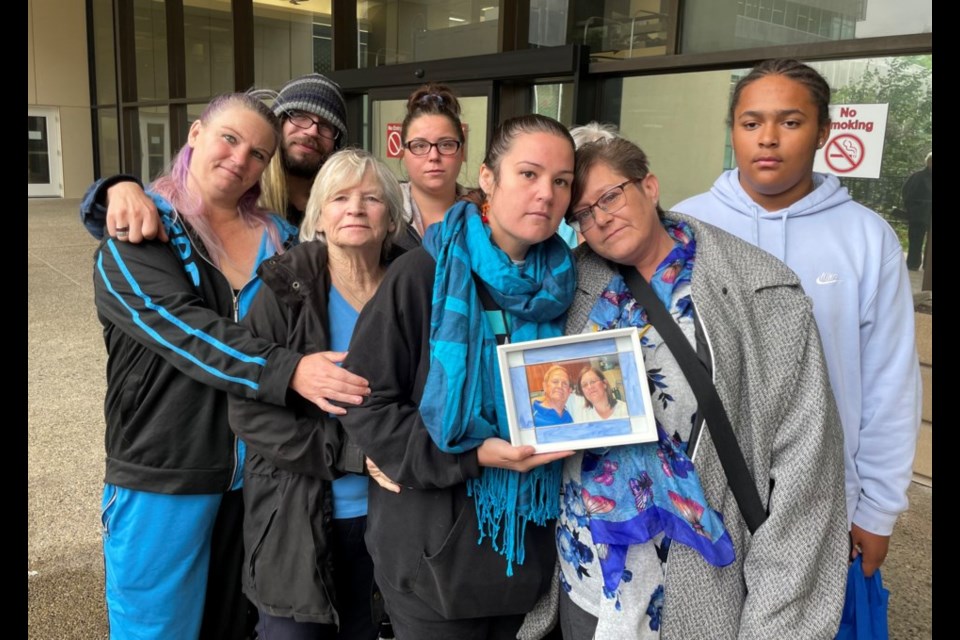Friends and family of slain St. Albert resident Ron Worsfold told the court their loved one was being remembered as a kind, vibrant and generous man and was not disposable or invisible.
Worsfold was killed by Beryl Musila, who was found guilty in June of first-degree murder, years after his 2017 slaying.
Five loved ones impacted by the crime gave statements on Wednesday, including Worsfold’s daughter, Stacey Worsfold; his grandchildren, Paxton Clarke and Shawna Marie Flett; his friend and co-worker, Donna Doak; and his friend, Kyla Mandrusiak.
Through tears, Stacey Worsfold detailed how her father’s murder stripped her of the chance to be by his side when he passed, and the chance to say goodbye.
“The murder of my father took away from me the one person who loved me completely,” she said, to the Court of King's Bench. “[His murder] is the nightmare that comes to me night after night and is now a companion to me daily in so many ways.”
Worsfold said she can no longer enjoy holidays now that her father is gone, she lost months of pay and work and she and her family have been left with permanent trauma. “You lose all sense of safety and security, you become fearful, untrusting,” she said.
"St. Albert society felt the loss, as my dad was not invisible, he was not disposable, and he was not reclusive. He was a healthy, vibrant, kind, generous soul who touched many people and lives, all of which felt the shock and loss of his murder.”
Paxton Clarke recounted the terror he felt when he got the call that his grandfather was missing and how he began running up and down the aisles of stores searching for Worsfold.
Clarke, who was composed as he began his statement, started to cry when he shared how he misses trying to fix his grandfather’s computer and the coin sets Worsfold would give him as presents.
“But what makes me the most sad is thinking that he never got to meet my daughter, which he would love and probably spoil,” Clarke said.
Donna Doak, who worked with Worsfold at a St. Albert Petro-Canada for 34 years, described Worsfold as her “best friend and work husband” and part of her family.
“When we would be at work we would talk about being robbed,” Doak said. “We both said we hoped the criminal would use a gun, and never a knife, because the thought of being stabbed was worse than death itself.”
“To find out that not only did you take his life, you stabbed him — I can’t get that image out of my mind.”
Granddaughter Shawna Marie Flett recalled how no less than 15 vehicles filled with family drove from Vancouver and Kamloops to attend Worsfold’s ceremony of life.
“Having the ceremony across from his long-time home was both a blessing and a curse as we looked over to what would have been the home of so many cherished memories, and the unwelcome knowledge that it had also been the home of his passing in such a brutal manner,” she said.
Worsfold’s friend Kyla Mandrusiak said the murder left her and her children afraid.
“I cannot forgive you, and will not,” she said to Musila.
Musila nodded as victims read their statements.
Indignity to human remains charges
On Monday and Tuesday the court heard arguments about an appropriate sentence for Musila’s treatment of Worsfold’s body.
Crown prosecutors Patricia Hankinson and Jason Schmidt argued for a 2.5 year sentence for Musila’s mishandling of Worsfold’s remains, but newly appointed defence lawyer Caitlin Dick said her client wanted a six-month reduction. The charge, under section 182 of the Criminal Code, carries a five-year maximum.
The sentence will be served concurrently with Musila’s life sentence for the first-degree murder of Worsfold. Musila pleaded guilty to indecently interfering with Worsfold’s remains at the outset of the trial. She pleaded not guilty to Worsfold's murder and represented herself during the nine-week-long trial, but a jury found her guilty in June.
Justice Larry Ackerl agreed to reduce the sentence by 30 days because of an earlier arbitrary detention in which Musila’s Charter rights were violated.
Musila duct-taped Worsfold’s ankles and loaded him into a tote container that she took with her to various locations in Edmonton, Morinville and St. Albert. Eventually, Musila moved the container to a friend’s rural property near Devon and asked her friends, who did not know it held a body, to help her take the container to a nearby makeshift dump.
Earlier in the trial Musila argued that she did not know that Worsfold’s body would be disposed of on the rural property when it was packed onto the truck. She urged the court to consider that Robert Rafters, her boyfriend at the time of Worsfold’s death, helped her move the body.
Ackerl said that it was “impossible, if not preposterous that [Musila] didn’t know” that Worsfold’s remains would be disposed of in the woods.
He said that Musila was wilfully ignorant of the purpose of the truck ride that carried Worsfold’s remains to the makeshift dump and that she was the only one at risk should the body be discovered.
“She was not a passive bystander,” he said.
Musila’s sentencing continues today at 11 a.m.




